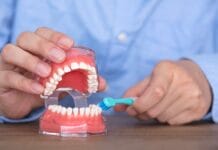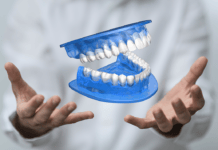As a parent to three biological children, I had a lot to learn when we adopted our youngest child. My husband and I completed the training required by our social worker and networked with countless foster and adoptive parents to learn more about what to expect as we planned to expand our family.
Even with extensive training, many adoptive and foster parents experience situations that they feel inadequately trained or capable of handling. What caught me off guard was how, as a dental hygienist, my adopted child’s oral hygiene wound up taking a back burner to the countless other physical and emotional needs that needed to be met once we brought her home.
Challenges Facing Children from Foster and Adoptive Backgrounds
Today, many foster children and adoptive families experience similar circumstances ‒ not just temporarily, but for years. Early childhood trauma, whether in utero or years after birth, can affect a child’s emotional regulation and behavioral needs well into adulthood. It doesn’t matter how early you begin caring for them; their trauma response and developmental needs may interfere with fine motor skills, eating disorders, nutritional deficiencies, oral habits, self-care and hygiene, and countless other conditions.
Adaptive parenting techniques are not a quick fix. When they do help, they may not entirely resolve the underlying issue, but rather, they may lessen the extent of it, including the oral health needs of their child.
Why Does Any of This Matter to Dental Professionals?
Well visits and dental care are often some of the first things parents address when bringing a child into their home via foster care or adoption. In many cases, these children have experienced neglect or lack the habits necessary for a healthy dentition.
In turn, they often require multiple restorative procedures, frequently requiring additional sedative medications to make the appointments possible. Even sitting through a prophylaxis may seem impossible. What might seem like a situation where behavioral correction or redirection is needed by an outsider or health care provider may actually be a behavior that is deeply rooted in childhood trauma.1
Not all types of trauma include obvious situations such as physical abuse or malnutrition. Many are unseen or invisible emotional needs tied to early disruptions between the child and their parent(s), caregiver(s), or due to institutionalization (such as a foreign orphanage).
Unfortunately, most types of trauma are rarely a quick or easy fix. Many children experience side effects well into adulthood, regardless of age at the time of placement in their new home or the parenting skills used.
Below are six ways dental health providers can help these children and their families.
1) Allowing Grace during Scheduled Appointments
A child may seem unwilling to sit for treatment, at least during the first two to three visits. Plan for the minimum, such as oral hygiene instruction or “counting” their teeth to screen for decay. Maybe it’s just sitting in the chair and watching them brush their teeth as you offer praise and guidance on their oral hygiene habits.
If the child cooperates, transition to additional steps at each recurring visit to build upon the foundation that you’re establishing. It is extremely important that the child not feel trapped or pressured to complete the next step in an appointment as this may trigger a trauma response such as “shutting down,” crying/raging, or being uncooperative. By establishing a healthy relationship of nonconfrontational care, dental providers can help these children feel more comfortable within the dental environment for future appointments.
2) Show Grace to the Caregiver
If the child’s oral hygiene is significantly lacking, know that many of these families just struggle to get through the day or to their appointment at all, especially if their child is living with a behavioral health condition such as oppositional defiant disorder (ODD) or reactive attachment disorder (RAD).2,3 Both of these behavioral health conditions are common in children who have experienced trauma at a young age. They typically present themselves with signs such as atypical social behavior, rebellion toward parents or caregivers, and/or a lack of respect toward others.
Understand that if the child has thick plaque buildup, gingivitis, or dental caries, it may not necessarily be neglect or ignorance on the part of their caregiver. It would likely be even more traumatic for the parent or caregiver to brush their child’s teeth forcefully. The more sympathetic you are to the parent’s responsibilities, the more likely they are to continue bringing their child or family to your practice and for you to make a difference in their oral health needs.
3) Focus on Prevention
When possible, use a tell-show-do approach to oral hygiene. Consider using disclosing agents to discuss proper brushing techniques with the child and apply fluoride whenever possible. If the child cooperates, recommend dental sealants.
Often, children with attachment disorders (common in the foster-adoptive community) will be more attentive to strangers than to the parent caring for them. If the child takes behavioral health medications such as mood stabilizers or those used for ADHD, many will also struggle with xerostomia or bruxism, further increasing their need for preventive dental care.
4) Be Mindful with Treatment Planning
If a child has incipient decay, incorporate treatment such as silver diamine fluoride to arrest caries in primary teeth. Of course, caries treatment is up to the dentist’s discretion, but you should all share the same vision for these children as a team.
If the child must receive restorative treatment in the immediate future, consider options such as oral sedation rather than “trying to see if they’ll get through it” and causing additional trauma.
5) Remember, There Are Other Things at Play
Situations related to medication management, counseling, completing homework, and even self-care are often everyday struggles for these children and their caregivers. A high percentage of these children will have unseen special needs such as emotional trauma or attachment disorders, even if they seem like typical children while they’re sitting in your operatory. It’s best not to make assumptions.
As oral health providers, we can support the family’s needs without making them feel an added layer of guilt on top of the responsibilities they’re already attempting to juggle. The family may already be challenged with the time-intensive demands of multiple doctor or therapist appointments in their busy calendar.
6) Be a Listening Ear
Many times, adoptive and foster families simply want someone to understand and not judge them, especially when their child has significant health or behavioral needs. A majority of adoptive or foster parents experience extremely high levels of stress. So it’s important dental providers be compassionate and supportive without necessarily needing to reply or interject their opinion on the matter.4 Simply nodding, making eye contact while listening, or patting someone on the shoulder at their appointment is enough to show them you’re there for them and genuinely care.
Making a Difference One Child at a Time
Being a trauma-informed dental provider can be a tremendous blessing to foster and adoptive families. Rather than making assumptions about a child’s behaviors or oral hygiene, ask yourself, “Could this child be experiencing some emotional trauma due to their background?” It does not matter if they were adopted at birth or came into their foster home as a teen; trauma can be deeply rooted and affect just about every aspect of the child’s life, including the future of their smile.
As dental providers, we can provide support both regarding the child’s health and the success of their family’s well-being and overall stress levels.
“As one person, I cannot change the world, but I can change the world for one person.” -Paul Shane Spear
Before you leave, check out the Today’s RDH self-study CE courses. All courses are peer-reviewed and non-sponsored to focus solely on pure education. Click here now.
Listen to the Today’s RDH Dental Hygiene Podcast Below:
References
- Blake, A.J., Ruderman, M., Waterman, J.M., Langley, A.K. Long-term Effects of Pre-adoptive Risk on Emotional and Behavioral Functioning in Children Adopted from Foster Care. Child Abuse Negl. 2022; 130(Pt 2): 105031. https://pubmed.ncbi.nlm.nih.gov/33757644/
- Oppositional Defiant Disorder (ODD) in Children. (n.d.). Johns Hopkins Medicine. https://www.hopkinsmedicine.org/health/conditions-and-diseases/oppositional-defiant-disorder
- Ellis, E.E., Yilanli, M., Saadabadi, A. Reactive Attachment Disorder. (2023, May 1). StatPearls. https://www.ncbi.nlm.nih.gov/books/NBK537155/#
- Barnett, E.R., Cleary, S.E., Butcher, R.L., Jankowski, M.K. Children’s Behavioral Health Needs and Satisfaction and Commitment of Foster and Adoptive Parents: Do Trauma-informed Services Make a Difference? Psychol Trauma. 2019; 11(1): 73-81. https://pubmed.ncbi.nlm.nih.gov/29723028/












